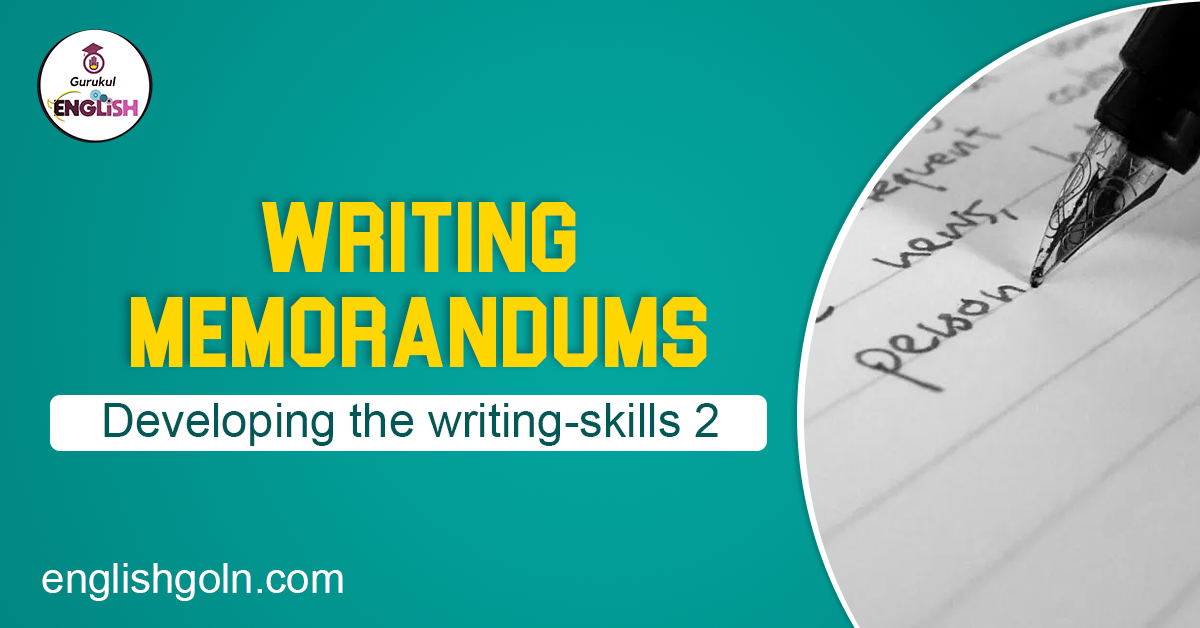Today is our topic of discussion Writing memorandums
Writing memorandums
A memorandum or memo (pl memorandums or memos) is a letter written inside an organisation. Memorandums usually carry messages which the employees of an organisation exchange at their work. Here is a model memo. Read it carefully.
German-Bangla Association
Date : 12 March 1999
To : Nazrul Islam
From: Rudia Sheffer
Subject:
Cost information for a 3-day training workshop at NAPE
The last Board meeting decided to hold this workshop at NAPE on 15-17 May with 20 participants from different places in greater Mymensingh district. Invitation letters have already been sent to the participants. Could you please find out how much the cost for the following would be ?
1. TA for 20 participants (list with their home addresses attached)
2. Costs for hostel rooms
3. Costs for food and refreshments
4. Costs for workshop hall/room equipped with OHP, whiteboard, etc.
Please call me if you need to know anything more. I’d be glad if you could give me the information by March 25.
Note the following aspects of the memo
1. Usually large organisations have printed memo stationery with headings such as name of organisation, Date, To, etc. However, handwritten memos are also used. In that case the name of the organisation does not have to be written.
2. A memo does not use any salutation (i.e. Dear Sir, etc.). It also does not have any complimentary ending (i.e. Yours sincerely, etc.).
3. A mema does not have to be signed. The writer just initials after his/her typed name.
However, in the case of a handwritten memo the writer usually initials it after the whole message.
Memorandums can also be written for circulating a policy/directive of an organisation. Here is a model memo written by the Executive Director of an NGO to all the employees. Read it carefully.
Project for Underprivileged People (PUP)
Date: October 14, 1998
Το : All employees
From: Hasanul Kabir Chowdhury
Subject:
Lunch at PUP Cofeteria
PUP is going to have its own cafeteria on the ground floor of Building 11 from November 1. You can have lunch there at subsidised rates. You can entertain one guest but for that you need to buy a guest coupon from the cafeteria counter.
You don’t have to pay cash for your meals. The cafeteria will maintain a register for the employees. Please make sure that they have rightly marked you present or absent for a meal. The lunch bills will be deducted from your monthly pay. If you don’t eat the cafeteria meal, you can still go there and eat your packet lunch/snacks you have brought with you.
All possible care is being taken to serve hygienic food and safe drinking water.
Write the following two memos.
(a) In A above Rudia Sheffer wrote a memo to Nazrul Islam requesting information about the costs of a 3-day workshop. Now Nazrul Islam replies also in a memo. Write the memo for Nazrul Islam. (The costs of different items don’t have to be exact. Approximate charges will do).
(b) The ABC Company paid huge telephone bills for the last 2 months. In a Board meeting some measures are suggested to check this excessive use of the company phones from the next month. Some of the measures are:
– All officers below directors will lock their phones during their absence.
– All NWD calls will be given through reception. The Receptionist will record the phone number and the purpose of an outgoing NWD call.
– One phone at the reception will be available 24 hours for emergencies.
Now write a memo on these directives asking all the employees to follow. The writer is the Managing Director of the ABC company.
